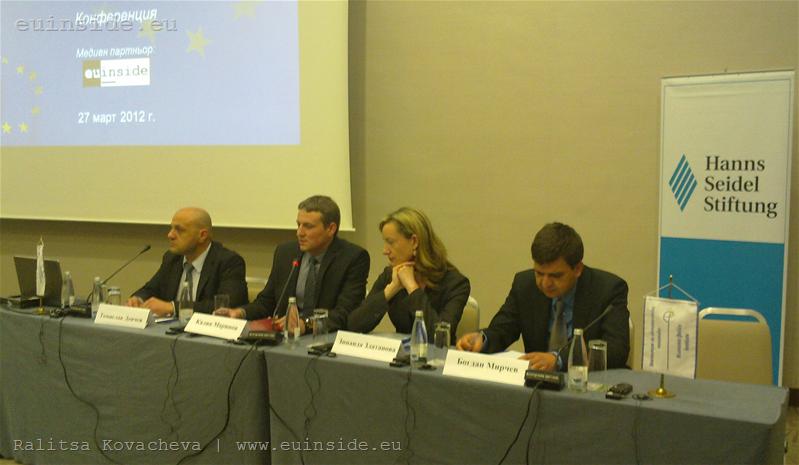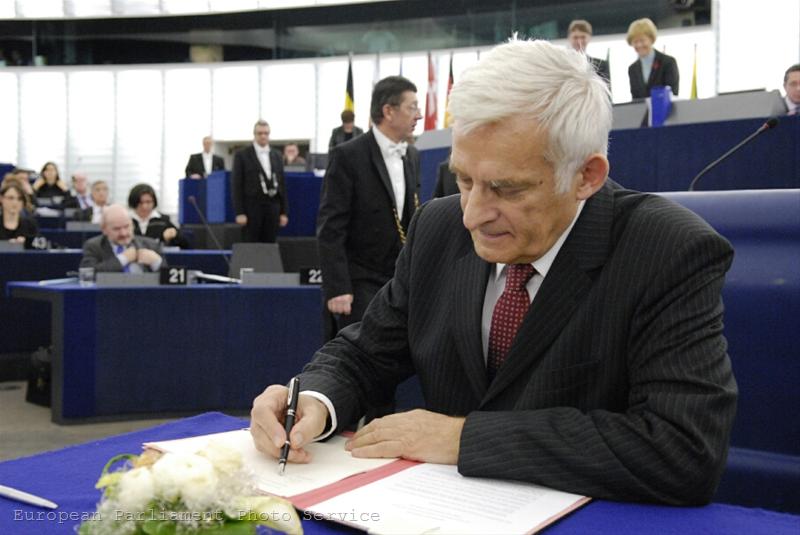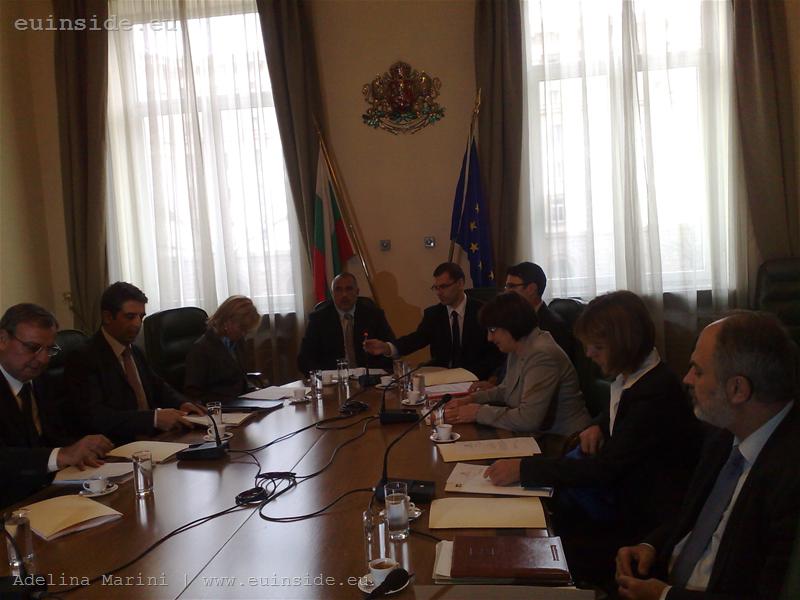Bulgaria Dooms Itself to Permanent Poverty
Adelina Marini, January 8, 2013
 There is a risk Bulgaria's economy to lock itself in a regime of low growth which will make it difficult to service its debt, concluded in the end of 2012 the European Commission in its Alert Mechanism Report on macro-economic imbalances, of which Bulgaria together with another 13 EU member states is part. According to the European Commission, the risks before the country's long-term growth potential are due to labour market weaknesses, growth of unemployment and high structural unemployment. This conclusion, in one form or another, can be seen in the government's Strategic Report 2012, published in the end of December. The report covers a period of three years, analyses the economic and social challenges, the impact of the EU funds and makes predictions for the next three years.
There is a risk Bulgaria's economy to lock itself in a regime of low growth which will make it difficult to service its debt, concluded in the end of 2012 the European Commission in its Alert Mechanism Report on macro-economic imbalances, of which Bulgaria together with another 13 EU member states is part. According to the European Commission, the risks before the country's long-term growth potential are due to labour market weaknesses, growth of unemployment and high structural unemployment. This conclusion, in one form or another, can be seen in the government's Strategic Report 2012, published in the end of December. The report covers a period of three years, analyses the economic and social challenges, the impact of the EU funds and makes predictions for the next three years.
The report says that the economic convergence, which is one of the main goals of the EU funds and all the Community strategic documents, like the Europe 2020 strategy for instance, is happening slowly and is not expected to soon become faster. In 2009, when the previous Strategic Report was published, the gross domestic product per capita (measured in purchase power) reached 43.8% of the EU average and the preliminary Eurostat data for 2012 point to 46%. The reasons behind that are several.
A growing gap between regions
The report points out that there is a deepening trend of concentration of population, economic and administrative activities in the capital city, thus increasing the gross added value of the South-West statistical region on a national scale (part of which is Sofia) to 55.7%. Next, but far behind, is the South-Central region which forms 11.6% of the gross added value. The document admits that the opposition 'capital vs regions' is typical for the Bulgaria's territory. It is no accident therefore that the European Commission warns that Bulgarian regions are among the most vulnerable in the EU in terms of global challenges. Among the risks are loss of bio-diversity, extincting species, loss of landscape and cultural heritage. Five out of the six statistical regions, according to the National Statistics Office from 2011, are among the last ten in the EU in terms of gross domestic product per capita.
The North-West region has GDP of 28% of the EU average; the North Central and the South Central have 30% each of the average; the South-East is with 36%; the North-East with 37%; the South-West with 73%. The latter is also with the biggest contribution to the GDP - 48.2% of the national gross domestic product is formed in the South-West region. The lowest contribution to the country's economy has the North-West region - 7.2 per cent. In terms of employment, the South-West region is again first (in the age group of 20-64 years), with employment multiplier of 71.2% in 2011. Unemployment is highest in the North-East region (15.6%). The South-West leads also in terms of share of highly educated population - 27.7%, as the document reads, that is due to the influence of the capital city which has the best educational characteristics of the population of the country.
Next are the North-East region with 18.5% and the North-Central region with 16.5 per cent. The North-West region is again in the most adverse situation in terms of highly educated people with 14.8 per cent and the South-Central with 15.8 per cent. The 2012 Strategic Report explains that the reason for the high levels of unemployment in the past years is due to the economic crisis, but also to the insufficient efforts of employers to train their workers. The report blames the private sector for not undertaking sufficiently adequate measures to fill the gap between skills and market needs. According to the forecast in the report, the unemployment level will remain around 12.4% nationally this year, while the expectations for 2014-2015 are not encouraging too, mainly due to deteriorated external environment.
Weak investments in research and development
Bulgaria is at one of the last places also according to the European Innovation Index, where in 2011 it "kept" the place before last in the EU27. According to the national statistics, in 2011 the spending for R&D was 219.7 million euros or 1.9 per cent more than in 2010. For the period 2000-2010 Bulgaria spent on average 0.49% of its gross domestic product for innovation, with EU average of 1.89%. In its programme for  development by 2020, the government plans to triple spending for R&D.
development by 2020, the government plans to triple spending for R&D.
In terms of spending for information and communication technologies, in 2009 it was 6.9% of GDP as the biggest share had the sector of electronic communication. In 2011, the connectivity of households to the Internet was 45% (of which 39.8% broadband) and the enterprises - 86.9% (68.5% broadband). In the end of the second quarter, according to the report, the share of Internet consumers in Bulgaria was 51%.
High energy intensity
Against the backdrop of the EU's efforts to boost energy efficiency as an effective tool to tackle the implications of the crisis, Bulgaria is first in terms of energy consumption for production of a unit GDP - 77.34% above the EU average. The report admits that the dependence of the Bulgarian economy on import of energy resources is relatively high, but it registered a decline from 51.7% in 2007 to 40.4% in 2010.
Impact of the EU funds
For 5 years of EU membership, Bulgaria for the first time presented a system that measures the impact of European subsidies in the autumn of 2012 - the SIBILA system. The report points out that the biggest progress was registered in terms of GDP per capita; level of employment; population that has access to water and drainage; level of economic activity (in the age group of 15-64 years); share of population between 18 and 24 years of age with lower than high school education; labour productivity and establishing a company. The assessment of the overall impact of the Cohesion Policy of the EU show that by the end of 2012 the net impact on GDP of spent money amounts  to 3%. The contribution of the Structural and Cohesion funds in the GDP growth in 2011 was 65%, according to the Strategic Report.
to 3%. The contribution of the Structural and Cohesion funds in the GDP growth in 2011 was 65%, according to the Strategic Report.
It forecasts that with the increase of payments on various operational programmes by the end of 2015, the net impact over real GDP is expected to be 9.3%. For the period 2009-2012, the impact of the EU funds is illustrated at best via key macro-economic indicators. For instance, private consumption rose by 3.9%, compared to a no-EU-funds scenario; private investments are with 5.4% higher in real terms; export has grown by 0.8%; import - by 4.5%; employment rose by 4% (as on average for the period 2011-2012 the generated jobs in the economy as a direct result of the EU funds are 105 000); the average wage has grown by 5.9% in nominal terms. The report forecasts that by 2015, when the period for absorption of the EU funds under the current budgetary framework (2007-2013), private consumption will grow by 8.5%; investments - by 37.8%; exports - by 6.1%; imports - 16.7%; employment by 6.6%; average wage by 33.6%.
Impact assessment of the operational programmes
Operational programme "Environment" (OPE) is one of the laggards out of seven operational programmes, and is with the highest risk of failure which is why the government has chosen an approach of over-contracting. By the end of October 2012, the agreed funds under OPE are a little over than 2 billion euros). With the aim to accelerate absorption rates, changes have been introduced, allowing broadeneing of the scope of the programme and inclusion of new beneficiaries. Money is envisaged for improvement of air quality, fight with forest fires and floods. The data for the set  objectives are very telling.27 integrated systems for waste management were planned to be built, of which only one is completed.
objectives are very telling.27 integrated systems for waste management were planned to be built, of which only one is completed.
The "Regional Development" programme is also among the risky ones, as according to an internal analysis of the management body of the programme, around 50 per cent of the overall volume of the contracts are at risk of failure due to untimely mobilisation of the teams who prepare the public procurement documents and the appeals. By the end of October 2012, the contracted funds are almost a billion and a half euros or 90.4% of the overall budget of the programme. In order to mitigate the risks, the management body of the programme envisages holding meetings with the beneficiaries whose projects are at risk, in order to discuss options to achieve the set objectives.
Operational Programme "Development of Human Resources" has contracts worth 790 million euros or 65.1 percent of the programme's budget. Another weakly performing programme is "Development of Competitiveness of the Bulgarian Economy". The contracts are worth 860 million euros (74% of the budget). "Administrative Capacity" is also lagging behind, as this is one of the programmes with the lowest amount of contracted funds, although when it started five years ago it was a leader. So far, 71% of the overall budget of the programme is contracted but the paid amounts are only 36.6%. As a reason for the bad performance the report points to the closure of the Ministry of State Administration and Administrative Reform in 2009 and the transfer of the management body of the programme to the Ministry of Finance. The outcome is a complete loss of 2010.
 In the context of implementation of the Europe 2020 strategy, the weakest performing programmes are "Competitiveness" and "Administrative Capacity" - are outlined as the key for overcoming the weaknesses in the business environment and for improvement of the administrative efficiency. The main goals in the national programme for development Bulgaria 2020, that overlap with the Europe 2020, are three:
In the context of implementation of the Europe 2020 strategy, the weakest performing programmes are "Competitiveness" and "Administrative Capacity" - are outlined as the key for overcoming the weaknesses in the business environment and for improvement of the administrative efficiency. The main goals in the national programme for development Bulgaria 2020, that overlap with the Europe 2020, are three:
- increasing living standards, access to quality education and training, employment and ensuring accessible and quality health care;
- building infrastructure networks (transport, energy, water);
- increasing competitiveness of the economy by improving the business environment, innovation and resource efficiency.
In its conclusions, the report points out that it is the administrative capacity that still is a key challenge in terms of implementation of programmes and projects. The local administrations continue to have problems when preparing and implementing projects. Another conclusion is that often "insignificant" projects are being implemented. That is why the government is preparing a comprehensive law on the management of EU funds and recommends enhanced dialogue with the social-economic partners, non- governmental organisations and local authorities in oder to identify those investments that would generate growth and would reduce regional disparities.
governmental organisations and local authorities in oder to identify those investments that would generate growth and would reduce regional disparities.
The new legislation for the EU funds is expected to be presented for public discussion in February and to enter into force on the 1st of January next year. It will cover mainly the new budgetary framework (2014-2020) but will also cover spending under the current framework which expires in 2013, but payments can be made until 2015. The main goal of the future law is to introduce unified documentation to apply for funds, simplified procedures, a possibility to integrate projects financed by various programmes. It is also envisaged to replace the currently existing contracts for EU funds with a decision by the management body.
On operational programme "Transport", the report outlines the launch of the two projects to extend the Sofia underground and the launch of two lots of the Trakiya motorway. 126 km of railways have been rehabilitated by the 31st of October.
The overall impact of the implementation of the operational programmes is the following: of the set goal to create 2120 jobs by October 31, 1647 have been created, and in 2011 - 1399. Of the goal to build 249 km of new roads, 82 km have been completed (again by October 31st). The situation with the implementation of the goal to  build new railways is 16 km out of 24. Of the envisaged 2180 km to be renovated, 454 km have been completed.
build new railways is 16 km out of 24. Of the envisaged 2180 km to be renovated, 454 km have been completed.
A good news in the 2012 strategic Report is the assessment of past errors and learnt lessons. The recommendations are also good. What lacks, however, not only in the conclusions of the report but also in all the strategic documents of the country, is ambition - higher goals, more political will to achieve them, less talking, more actions and higher quality of implementation. This assessment is especially important right now when the final agreement on the next budgetary framework of the EU is under way.
 | © European Union
| © European Union | © euinside
| © euinside | © euinside
| © euinside | © European Parliament Photo Service
| © European Parliament Photo Service | © Audiovisual Service
| © Audiovisual Service | © euinside
| © euinside